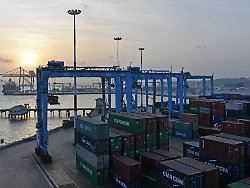Sunday December 27, 2020
Less tariffs, less poverty
Africa is slowly starting to free trade
In a few days, one of the world's largest free trade zones will start in Africa with a six-month delay. In the medium term, the reduction in customs duties and bureaucracy could lead millions of people out of poverty. But there is a long way to go before the agreement is implemented.
The African Free Trade Area (AfCFTA) is launched at the turn of the year. Originally planned for July 1 of this year, the start had been postponed by six months to January 1, 2021 due to the corona pandemic. According to estimates by the World Bank, the free trade area could lift around 30 million people from poverty by 2035, increase the continent's income by 450 billion dollars (385 billion euros) and exports within the continent by 81 percent.
Trade within Africa is currently still hampered by high import duties and bureaucratic hurdles. Experts therefore warn that the members must implement the agreement quickly and consistently. With all African countries, AfCFTA will encompass a market of 1.2 billion people and be one of the world's largest free trade areas. So far, almost all African countries have signed the agreement and around three dozen have ratified it.
With the groundbreaking resolution for an African free trade area, African countries had given themselves a very demanding agenda, said Chancellor Angela Merkel on a visit to South Africa at the end of 2019 before the Corona crisis began. The transition must now be made to a self-sustaining economic upswing in Africa.
Investments from abroad are falling
The old dream of a pan-African free trade zone is initially considered to be an ideal value that still has many obstacles in the way of its implementation. The head of the German Chamber of Commerce and Industry for Southern Africa sees a rather sluggish start not only because of the corona restrictions. "It simply has to become better known and there must be examples in practice where the regulations have led to simplifications or simplifications," said Matthias Boddenberg.
According to the World Bank, the planned free trade zone is particularly important because of the Corona crisis. According to the International Monetary Fund, the continent is threatened with a decline in economic output of at least 3.2 percent in 2020. AfCFTA can cushion the negative consequences of the crisis on economic growth by supporting regional trade and value chains, according to the World Bank.
Stephen Karingi from Africa's Economic Commission ECA therefore urges more effort. "When attracting direct investment from abroad, Africa's economies are still selling below value." In recent years, investments have melted like butter in the sun: While they reached 56.6 billion dollars in 2015, their value in 2017 was 42 billion dollars: "This number represents less than three percent of global investment flows."
The Berlin Institute for Population and Development emphasized in a study that progress in the central development areas of health, education and agriculture is particularly important. Scientists like the South African professor Tshilidzi Marwala hope, thanks to technical and social innovations, especially in the field of information and communication technology, to be able to skip individual stages of development. Otherwise, the head of the University of Johannesburg warns that there will be a growing gap between Africa and the industrialized countries.
. (tagsToTranslate) economy (t) Africa (t) free trade agreement (t) World Bank (t) economic growth (t) investments
